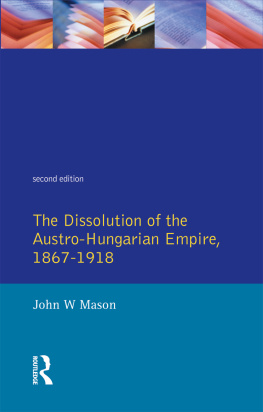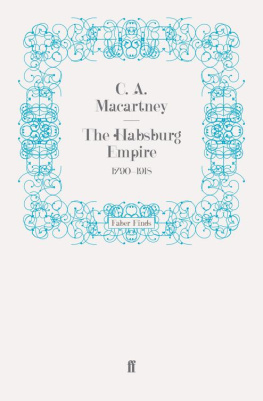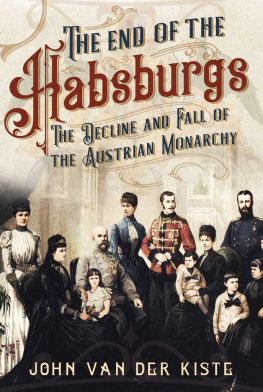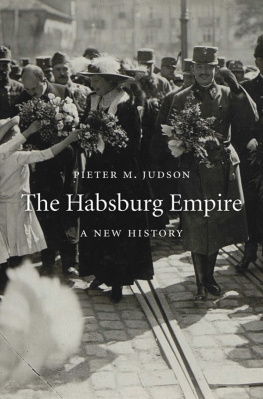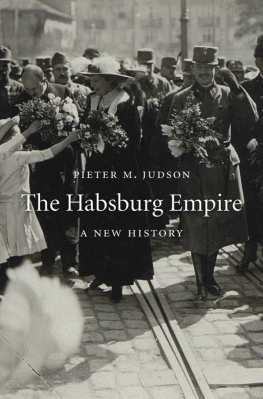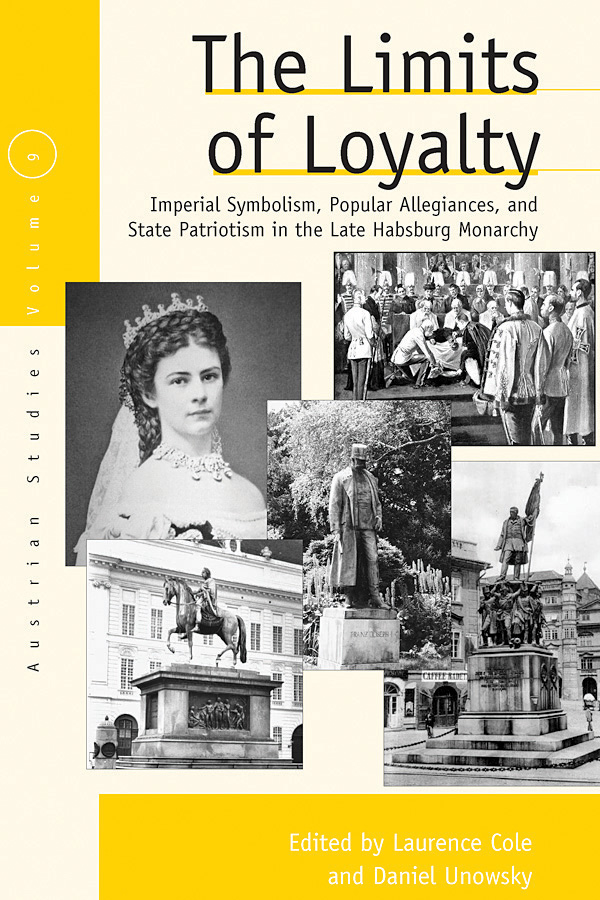T HE L IMITS OF L OYALTY
A USTRIAN AND H ABSBURG S TUDIES
General Editor: Gary B. Cohen, Center for Austrian Studies, University of Minnesota
Volume 1
Austrian Women in the Nineteenth and Twentieth Centuries:
Cross-Disciplinary Perspectives
Edited by David F. Good, Margarete Grandner, and Mary Jo Maynes
Volume 2
From World War to Waldheim: Culture and Politics in Austria and the United States
Edited by David F. Good and Ruth Wodak
Volume 3
Rethinking Vienna 1900
Edited by Steven Beller
Volume 4
The Great Tradition and Its Legacy: The Evolution of Dramatic and Musical
Theater in Austria and Central Europe
Edited by Michael Cherlin, Halina Filipowicz, and Richard L. Rudolph
Volume 5
Creating the Other: Ethnic Conflict and Nationalism in Habsburg
Central Europe
Edited by Nancy M. Wingfield
Volume 6
Constructing Nationalities in East Central Europe
Edited by Pieter M. Judson and Marsha L. Rozenblit
Volume 7
The Environment and Sustainable Development in the New Central Europe
Edited by Zbigniew Bochniarz and Gary B. Cohen
Volume 8
Crime, Jews and News
Edited by Daniel Mark Vyletta
Volume 9
The Limits of Loyalty: Imperial Symbolism, Popular Allegiances, and State
Patriotism in the Late Habsburg Monarchy
Edited by Laurence Cole and Daniel L. Unowsky
T HE L IMITS OF L OYALTY
Imperial symbolism, popular allegiances,
and state patriotism in
the late Habsburg Monarchy

Edited by
Laurence Cole
and
Daniel L. Unowsky

First published in 2007 by
Berghahn Books
www.berghahnbooks.com
2007, 2009 Laurence Cole and Daniel L. Unowsky
First ebook edition published in 2014
All rights reserved.
Except for the quotation of short passages for the purposes of criticism and review, no part of this book may be reproduced in any form or by any means, electronic or mechanical, including photocopying, recording, or any information storage and retrieval system now known or to be invented, without written permission of the publisher.
Library of Congress Cataloging-in-Publication Data
The limits of loyalty : imperial symbolism, popular allegiances, and state patriotism in the late Habsburg monarchy / edited by Laurence Cole and Daniel L. Unowsky.
p.cm. (Austrian and Habsburg studies ; v. 9)
Includes bibliographical references and index.
ISBN 978-1-84545-202-5 (hbk) -- ISBN 978-1-84545-717-4 (pbk) -- ISBN 978-0-85745-224-5 (ebk)
1. Habsburg, House of. 2. AustriaPolitics and government18481918. 3. Europe, CentralPolitics and government. 4. NationalismAustria. 5. Group identityAustria. I. Cole, Laurence. II. Unowsky, Daniel L., 1966.
DB47.L56 2007
943.604dc22
2007034705
British Library Cataloguing in Publication Data
A catalogue record for this book is available from the British Library
ISBN: 978-1-84545-202-5 hardback
ISBN: 978-1-84545-717-4 paperback
ISBN: 978-0-85745-224-5 ebook
C ONTENTS

C ONTRIBUTORS

Hugh LeCaine Agnew is Professor of History and International Affairs and Associate Dean of Faculty and Student Affairs at George Washington University. He is the author of Origins of the Czech National Renascence (1993), and most recently, The Czechs and the Lands of the Bohemian Crown (2004).
Ernst Bruckmller is Professor of Economic and Social History at the University of Vienna. He was joint coordinator of a major project on the history of the bourgeoisie in the Habsburg Monarchy. His most important works include Sozialgeschichte sterreichs (2nd edition, 2001) and Nation sterreich: kulturelles Bewutsein und gesellschaftlich-politische Prozesse (2nd, expanded edition, 1996), which has also appeared in translation as The Austrian Nation: Cultural Consciousness and Socio-Political Processes (2003).
Laurence Cole is Lecturer in Modern European History at the University of East Anglia. He is the author of Fr Gott, Kaiser und Vaterland: Nationale Identitt der deutschsprachigen Bevlkerung Tirols 18601914 (2000), and has recently edited Different Paths to the Nation: National and Regional Identities in Central Europe and Italy, 18301870 (2007). Currently, he is co-editor of European History Quarterly.
R.J.W. Evans is Regius Professor of History at the University of Oxford. His most well-known work is The Making of the Habsburg Monarchy, 15501770: an Interpretation (1979), and he has edited several collections, including (both with H. Pogge von Strandmann) The Coming of the First World War (1990) and The Revolutions in Europe, 18489: From Reform to Reaction (2000). Most recently, he has published a volume of his essays, Austria, Hungary, and the Habsburgs: Central Europe, c. 16831867 (2006).
Alice Freifeld is Associate Professor of History at the University of Florida. Her book, Nationalism and the Crowd in Liberal Hungary, 18481914 (2000), was awarded the 2001 Barbara Jelavich Book Prize of the American Association for the Advancement of Slavic Studies. She is also co-editor (with Peter Bergmann and Bernice Glatzer Rosenthal) of East Europe Reads Nietzsche (1998). She is currently working on a study of displaced persons in Hungary after World War II.
Sarah Kent is Professor of History at the University of Wisconsin-Stevens Point. She has published articles on Croatia and Bosnia and is completing a monograph on Franz Josephs visit to Zagreb in 1895.
Alon Rachamimov is a Senior Lecturer in Modern European History at Tel Aviv University. He is the author of POWs and the Great War: Captivity on the Eastern Front (2002), which was awarded the Fraenkel Prize for Contemporary History for a first major work. He is currently working on a comparative study of POW theaters during World War I.
Daniel L. Unowsky is Professor of History at the University of Memphis. He is the author of The Pomp and Politics of Patriotism: Imperial Celebrations in Habsburg Austria, 18481916 (2005), and is working on a study of the 1898 anti-Jewish riots in the Habsburg province of Galicia.
Nancy Wingfield is Professor of History at Northern Illinois University. Among her published works are: Staging the Past: The Politics of Commemorations in Habsburg Central Europe, 1848 to the Present (2001) and Gender and War in Twentieth-Century Eastern Europe (2006), both edited with Maria Bucur. Her most recent book, Flag Wars and Stone Saints: How the Bohemian Lands Became Czech



